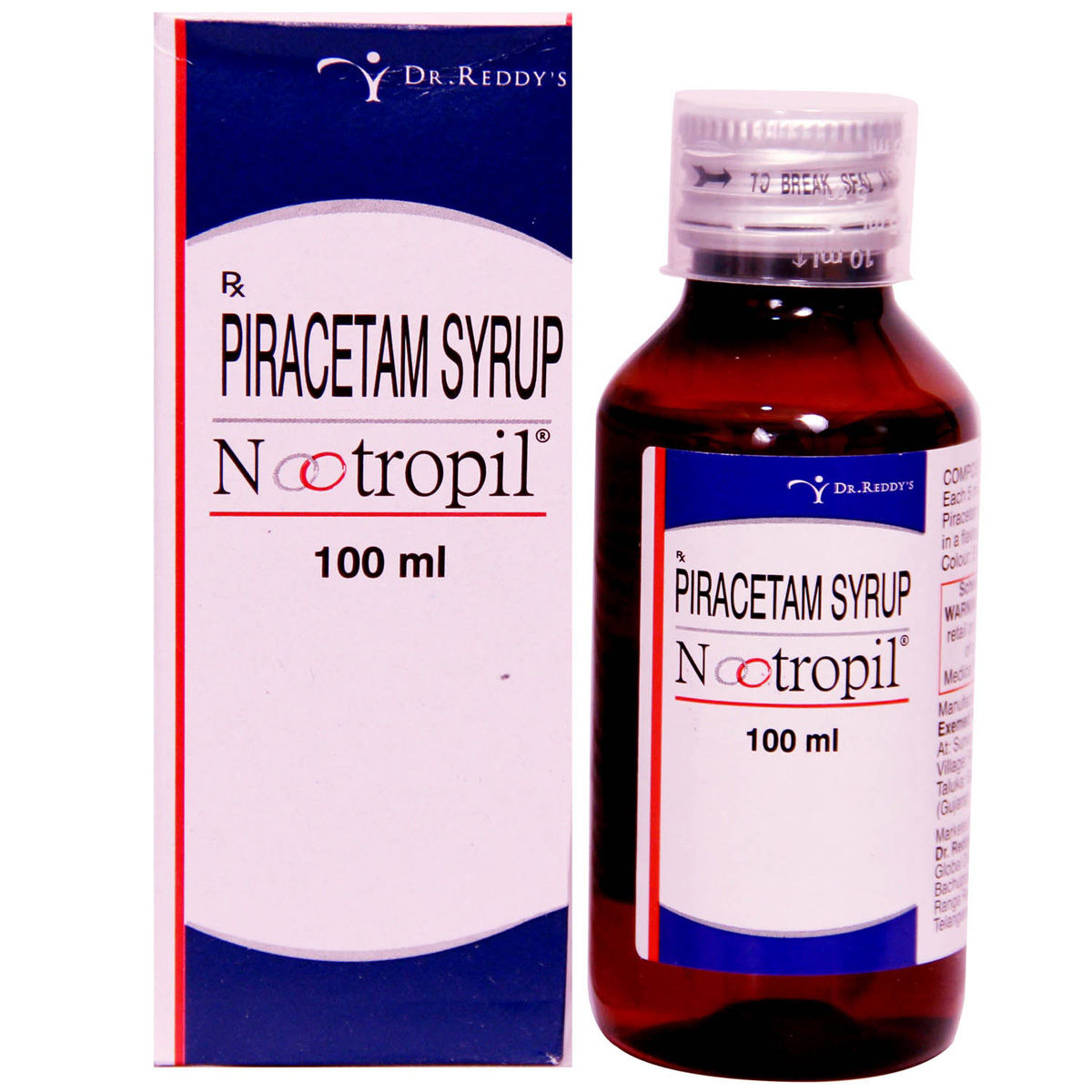Memocetam Syrup 100 ml
₹173.7*
MRP ₹193
10% off
₹164.05*
MRP ₹193
15% CB
₹28.95 cashback(15%)
Free Delivery
With Circle membership
(Inclusive of all Taxes)
This offer price is valid on orders above ₹800. Apply coupon PHARMA10/PHARMA18 (excluding restricted items)
Know Your Delivery Time
Provide Delivery Location

Whats That

Secure Payment

India's Most Trusted Pharmacy

Genuine Products
Composition :
Manufacturer/Marketer :
Consume Type :
Return Policy :
Expires on or after :
About Memocetam Syrup
Memocetam Syrup belongs to a group of medicines called GABA analogues used to treat myoclonus (a movement disorder). Additionally, Memocetam Syrup is also used to treat memory disorders, vertigo, and dyslexia (learning disorder) in children above 8 years. Myoclonus is a movement disorder that causes uncontrollable twitching and jerky movements of arms and legs.
Memocetam Syrup contains 'Piracetam' that acts on the brain and nervous system, thereby protecting against shortness of oxygen. It also improves the activity of a chemical messenger called acetylcholine, which helps in communication between brain cells.
You are advised to take Memocetam Syrup as long as your doctor has prescribed it for you, depending on your medical condition. In some cases, you may experience certain common side effects, such as headache, sleepiness, stomach pain, diarrhoea, weakness, nausea, and restlessness. You are advised to talk to your doctor if the side effects persist or worsen.
Please do not stop taking Memocetam Syrup without consulting your doctor. Consult your doctor if you are pregnant or breastfeeding. Avoid driving or operating machinery as Memocetam Syrup causes drowsiness, sleepiness and shakiness. Avoid consuming alcohol along with Memocetam Syrup as it could lead to increased sleepiness. Memocetam Syrup is not recommended for children below 8 years as the safety and effectiveness have not been established.
Uses of Memocetam Syrup
Medicinal Benefits
Memocetam Syrup is a nootropic drug which belongs to a group of medicines called GABA analogues. Memocetam Syrup is used to treat myoclonus (a movement disorder). Additionally, Memocetam Syrup is also used for the symptomatic treatment of cognitive and memory disorders caused due to organic disorder, vertigo, and dyslexia (learning disorder) in children above 8 years. Memocetam Syrup acts on the brain and nervous system, thereby protecting against shortness of oxygen. It also improves the activity of a chemical messenger called acetylcholine, which helps in communication between brain cells. Memocetam Syrup may also act on the N-methyl-D-aspartate (NMDA) receptors that are involved in the transmission of nerve signals, which play an important role in memory.
Side Effects of Memocetam Syrup
- Headache
- Sleepiness
- Stomach pain
- Diarrhoea
- Weakness
- Nausea
- Restlessness
Directions for Use
Storage
Drug Warnings
Do not take Memocetam Syrup if you are allergic to any of its components; if you have/had a serious kidney problem, Huntington's disease or brain haemorrhage. Inform your doctor if you have kidney dysfunction or bleeding problems. Consult your doctor if you are pregnant, planning for pregnancy or breastfeeding. Avoid driving or operating machinery as Memocetam Syrup may cause drowsiness, sleepiness and shakiness. Avoid consuming alcohol along with Memocetam Syrup as it could lead to increased sleepiness. Memocetam Syrup is not recommended for children below 8 years as safety and effectiveness have not been established.
Therapeutic Class
Drug-Drug Interactions
Drug-Food Interactions
Diet & Lifestyle Advise
Maintain proper weight by following a healthy diet.
Exercise regularly as it helps in less cognitive decline and brain volume loss.
Avoid smoking and alcohol consumption.
Try to avoid stress by practising meditation or yoga.
Include fruits and vegetables in your diet as they contain anti-oxidants.
Avoid late-night exercises as they can increase muscle twitches.
Create a bed-time routine as it helps in relaxation and stress reduction.
Follow a healthy lifestyle as it helps in improving overall health and possibly protects the brain.
Habit Forming
How Memocetam Syrup Works
What if I have taken an overdose of Memocetam Syrup
Alcohol
Unsafe
Avoid consumption of alcohol while taking Memocetam Syrup as it may cause increased drowsiness and sleepiness.
Pregnancy
Caution
Please consult your doctor before taking Memocetam Syrup if you are pregnant.
Breast Feeding
Caution
Please consult your doctor if you are breastfeeding; your doctor will decide whether Memocetam Syrup can be taken by breastfeeding mothers or not.
Driving
Unsafe
Memocetam Syrup may cause drowsiness and shakiness. Do not drive or operate machinery.
Liver
Caution
Dose adjustment may be needed in patients with liver impairment. Please consult your doctor if you have a liver impairment or any concerns regarding this.
Kidney
Caution
Dose adjustment may be needed in patients with kidney impairment. Please consult your doctor if you have kidney impairment or any concerns regarding this.
Children
Caution
Memocetam Syrup is not recommended for children below 8 years as safety and effectiveness have not been established. Memocetam Syrup may be prescribed for dyslexia (learning disorder) in children above 8 years.
Country of origin
Manufacturer/Marketer address
Author Details
We provide you with authentic, trustworthy and relevant information
FAQs
Disclaimer
Product Substitutes
Reference
- https://www.medicines.org.uk/emc/files/pil.2990.pdf
- https://www.drugs.com/uk/piracetam-800mg-tablets-leaflet.htmlhttp://mri.cts-mrp.eu/download/PL_H_0217_002_FinalPI.pdf
- https://gskpro.com/content/dam/global/hcpportal/en_AM/PI/Nootropil-tablets-SmPC-2016-02-09.pdf
- https://tajlifesciences.com/portfolio/piracetam-tablets-400mg/
- https://file.wuxuwang.com/hma/PL_H_0217_001_FinalPI.pdf

















